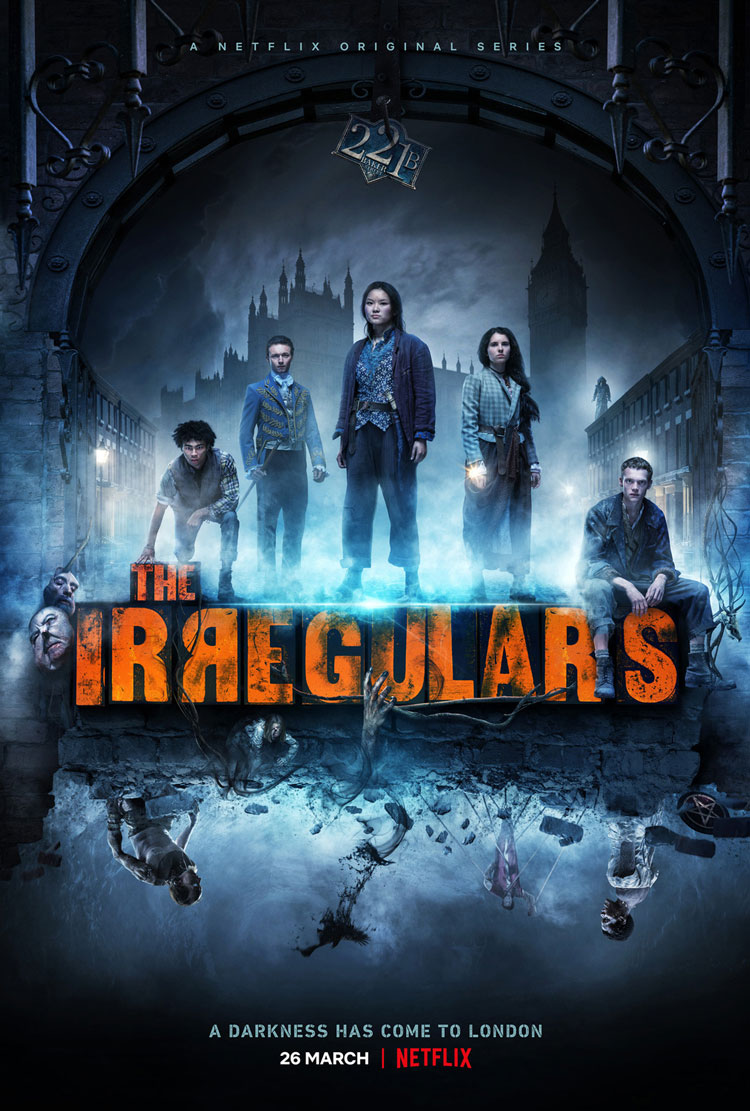“I got worried at one point… I was like, the [Sherlock] purists are gonna come for us with the pitchforks, like ‘WHAT HAVE YOU DONE?’” laughs Jojo Macari, one of the stars in Netflix’s upcoming Sherlock Holmes series The Irregulars. “But I think what makes our story told in the Sherlock world different is the fact that it’s shown through some totally different set of eyes. You’re looking at this world through some people who have experienced that world in a totally different way than Sherlock or Watson would have done in a version of Sherlock Holmes that is told by Dr Watson.”
Indeed, one of the… er… irregular elements of this new Sherlock Holmes series is that it does not, in fact, centre on the famous detective and his companion, Dr Watson at all. Indeed, the great detective doesn’t even turn up until episode five (but more on that later).
Instead, The Irregulars focuses on a group of young troubled street teens who get recruited by Watson to use their underground connections to solve some of the more unsavory crimes. Comprising of group leader Bea (Thaddea Graham), her sister Jessie (Darci Shaw) and their two friends Blly (Macari) and Spike (McKell David), the group reluctantly don their own detective hats for some extra money, but they may have bitten off more than they can chew as the crimes become more and more sinister…
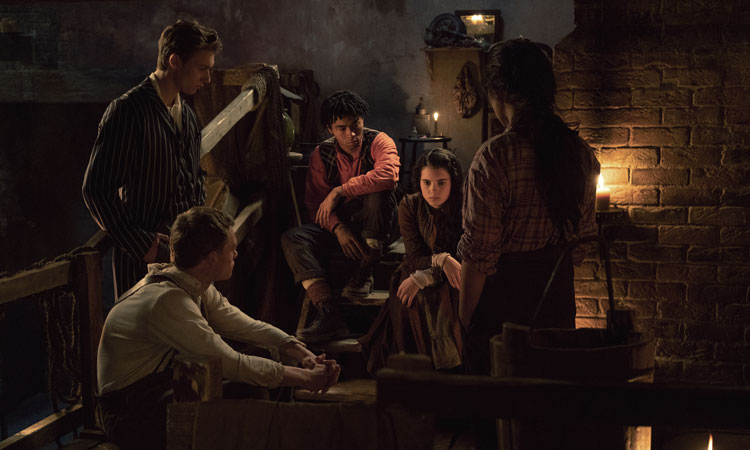
“The series is sort of about us,” Macari continues. “It’s not particularly about Sherlock Holmes. It’s set in his world but it focuses on us driving the story forward I guess. There’s also the supernatural elements of it, which obviously brings a whole new box of frogs out to play with!”
Ah yes, that’s the other element about The Irregulars that makes it stand out from the plethora of Sherlock tales. Whereby the original books and plenty of the on-screen incarnations of Sherlock have always skirted on the supernatural, many don’t actually delve into that area. This new series, however, most certainly does – expect ghosts, witches, demons, portals to other realms and plenty more spooky shenanigans in The Irregulars.
Those supernatural elements are largely told via Jessie – who has a strange connection with the supernatural. A gift (or perhaps curse) that helps our gang take on those more unusual crimes… “Jesse has these horrific nightmares where she thinks she’s in these tunnels in hell or somewhere really dark and creepy,” Darci Shaw tells us of her character, whose nightmares seem to have a connection to the real world. “There’s a lot of monsters that follow her around there and she’s threatened with these big, tall dark figures all the time. As the story goes on, we see Jesse gaining more and more control over these nightmares and at the end of episode one, she meets a character called the Linen Man (Clarke Peters) and he tells her maybe these crazy fits of paranoia or whatever it is could be a power. This could be something that [she] could use for good…”
Monsters aren’t only evident in Jessie’s dreams in The Irregulars. As the gang delves deeper and deeper into London’s seedy underworld, they come face to face with more than criminals and gang leaders. Indeed, the show follows a loose ‘monster of the week’ structure, with a wider story arc for the series as a whole.
“We have these different monsters each episode and they do have a human side and a reason for why they’re causing this havoc,” Thaddea Graham explains, who plays group leader Bea. “This pain from within is causing them to act out against people and basically rip peoples’ eyes out!”
“We had this one set where we were filming with a guy called the ‘jigsaw man’ who is a character made up of 16 different people sewn together from different body parts,” Macari remembers. “Really freaky and all prosthetics – no CGI. [It was] really incredible, massive big up to our make up team for that.”
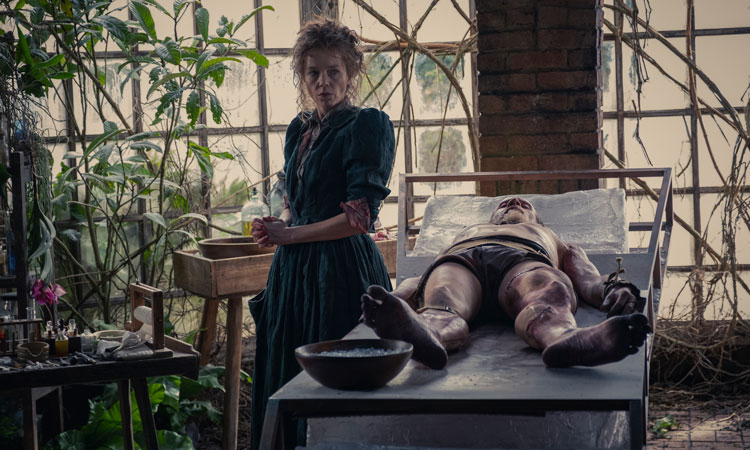
“I think it’s quite fascinating because there is a reason for everything,” Graham tells us. “Our writer, Tom Bidwell has really done that perfectly in that it’s not just meaningless things that are happening. People don’t just get murdered for no reason. There’s this human side to everything and there’s a reason behind everything. So I think having the supernatural but then also having this reason, it really does bring something new.”
Those human elements come largely from the group itself and their varying relationships. From the sisterly bond between Bea and Jessie, to romance via a newcomer to the group in the shape of Leopold (Harrison Osterfield) and the friendship they all share, the core to this supernatural Sherlock series is surprisingly nothing to do with either of those elements; rather the very human and very complex relationships between this young group of people.
“I just love the gang dynamic when everyone’s together, when everyone is bouncing off each other in a scene,” Shaw says. “I think when it’s the five of us, I really love those scenes, I really enjoyed doing them because I really do feel like we all have our own little place in it. It was just a pleasure to play with the other guys. That was my favourite.”
“I love Bea and Jessie,” Graham adds. “I really love that bond and I love that it’s at the forefront of this. Love is driving Bea constantly throughout the show, but it’s love for her sister and nothing will ever get in the way of that. I also really love the dynamic between Bea and Watson, I think it’s really interesting to watch, they’re constantly trying to one up each other.”
“I mean all the relationships are so great,” Harrison Osterfield agrees. “I think Bea and Jesse are really, really strong and I think a lot of people can empathise with that at home as well. This sort of being in a family and being siblings and that strong bond that people have between them.”
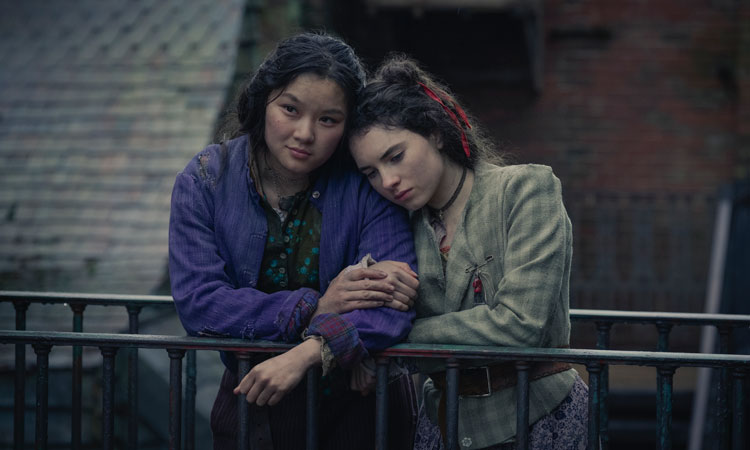
Those complex relationships also apply to Sherlock and Watson themselves. Yes, you may be wondering if this is a Sherlock series at all, with the great detective not being mentioned very much. This is because he has been largely absent from those around him due to being at a very low point in his life. Just like the series itself, this is unlike any Sherlock you would have seen – this is an older, more jaded version of Holmes; past the fame and fortune of his career and currently lost in a dark well of drugs and desperation after a personal trauma.
“We’re exploring his notion of pain, regret, things he could have done differently,” says Henry Lloyd-Hughes who plays Sherlock. “I think that in a way it plays into the story of fame, plays into the story of the ideas we have about people or literary figures. It’s the same thing whether they’re celebrities or not versus the reality of their lived existence. So in his relationships, I think we’re mining some uncharted territory in terms of how someone like Sherlock would react to things going wrong, things going massively wrong, things completely coming apart and that sense of: If he could have done something differently, what would he have done?
“I think one of the interesting things about this version [of Sherlock], which is slightly more meta, is that we’re aware of his myth-making. There’s a great line in the [series] where he’s talking to Bea about the history of Sherlock and Watson. He says: “Then we cracked our first big case, you probably heard of it,” and she says, “I haven’t”. And he’s floored. I think it’s really important to have that sense of a punctured ego and to have an ego as part of his story. That’s a key, it’s one of the pillars.”
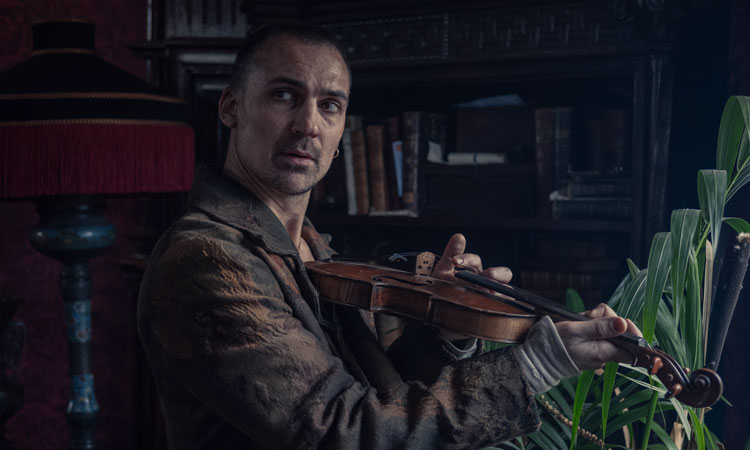
You certainly won’t be finding the perfect criminal mastermind in The Irregulars. Like pretty much everything about the show, it will surprise you, especially in its depiction of Arthur Conan Doyle’s famous literary characters…
“Holmes and Watson have always been very full, rounded characters, flawless even,” says Royce Pierreson who plays John Watson. “Especially Watson – he’s nearly flawless as a man, and I wanted to flip it on its head and make him a kind of world-weary, troubled man who’s running from his past. He’s had to adapt, he’s had to survive and I started playing around with the idea that he was an impostor, and he kind of just jumps into whatever character is there to survive in a situation. So it built this version of Watson that was totally different to anything that I’d seen before and anybody else would have seen before. He just so happens to be called ‘John Watson’, so to join the list of people who played Watson in the past is fantastic, but it was me portraying a complex human being.”
“I think what makes [The Irregulars] really different is that forever we’ve known Sherlock Holmes as a confident, powerful man that can talk his way in and out of any situation and is always in control, and is always one step ahead, but what if he’s not…” adds McKell David who pays Spike. “Nobody’s unbreakable. Nobody is invincible so what happens when that man gets broken? I think for the Sherlock purist, that should be really interesting. If you’ve been a fan of Sherlock for so long, you would wonder what he could be like and what could lead him to be so broken. I think that’s what makes it so interesting.”
About halfway through the series, audiences will get some insight into why Sherlock is so broken as told through flashbacks from some 15 years previously. But that time jump was both a help and a hindrance when telling Sherlock and Watson’s complex story…
“To explore a kind of emotional trajectory over a 15 year age gap – aging younger and older in different phases – that was bold in terms of ‘to boldly go’ where I felt like we haven’t gone before necessarily as a viewer,” laughs Lloyd-Huges. “There’s much more of an emotional arc, much more of an exploration of the emotional world of the character of Sherlock Holmes than we’ve seen before.”
“The time jump was difficult because it was trying to hint at a time and keep the truthfulness of where we are 15 years later,” Pierreson explains. “It was a bit of a headscratcher for me that I kind of created on my own. I remember constantly thinking about the energy of Watson and Sherlock 15 years previous, and what baggage we hadn’t yet taken on. So it was a challenge. I’ve never played a time jump like that, but I think it really, really works and it’s exciting to see that duality of these men who are so different over that amount of time.”
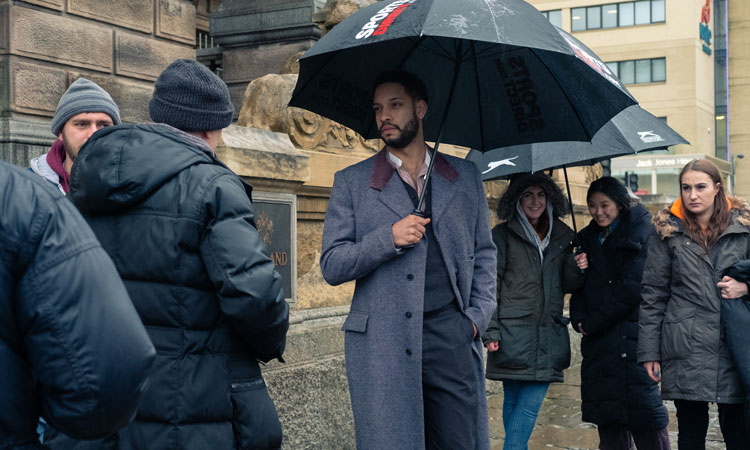
“Trying to connect those things, so to seed something in one timeline and make sure that you can see it through to 15 years later… It feels like you need to push these two narratives in very different directions and yet it not feel like two characters, that’s the challenge,” Lloyd Hughes agrees. “That was certainly the hardest thing. It was like ‘okay, I can see this Sherlock and now I need to try and find a way to bridge the two and to explain it’.
“Weronika [Tofilska], who directed episodes five and six, deserves a lot of credit because I sat with her for days and days and we built like what you see in a police procedural – a full spider diagram of different things that happened at different periods of time that connected all the characters. Not every director does that, but it took her and I to do a really deep dive for me to feel that all of the complexity was there. That we weren’t just taking a punt. That what we were trying to explore was rooted and everything had a place.”
There is always going to be a sense of burden when playing such iconic roles, but with The Irregulars taking such a unique spin on these well-known characters, and adding a lot of new characters besides, that pressure was eased somewhat…
“I never felt, even when I was reading the scripts cold, that there was any danger that we were going to be treading on anyone’s toes of anything that happened before,” Lloyd-Hughes says. “Right from the get-go, you’re in this other universe, you’re in a whole new world of trouble and pain and apocalyptic things happening which feels weirdly apt for 2020 and 2021.
“[This is] because of the unique circumstances that the characters in our world find themselves in and the elements that take you very rapidly away from, should we call it the ‘Traditional Fireside Victorian Drama’ of dare I say, maybe slightly gentle crime-solving and into a full on supernatural and epic encounter! It feels like we ended up with the Sherlock that we needed and the Sherlock and Watson that we needed for right now.”
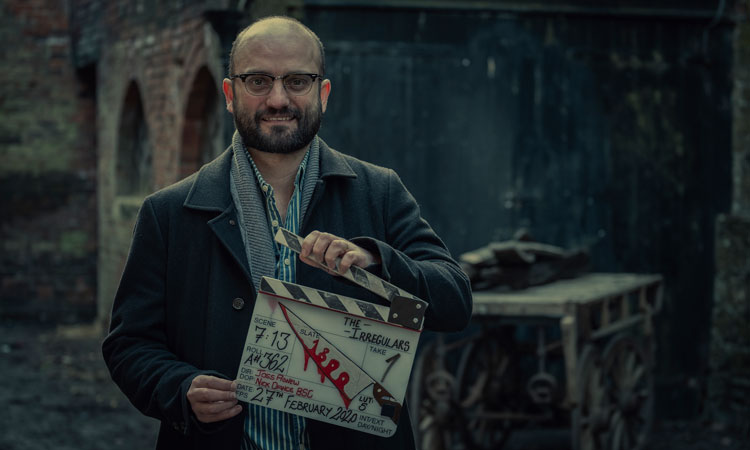
“I think there’s a pressure with every new show that you do and I think we put the biggest amount of pressure on ourselves,” Graham says. “But it was exciting to try and take on an a new version of a world that we’re so familiar with and I think Tom [Bidwell] has created this really deep, beautiful, rich story that has these supernatural elements and we have those really iconic figures; Sherlock, Watson, Mrs Hudson, but not as we’ve seen them before. So I think there was a bit of [pressure] because it has such a big fanbase already, but I really hope that they enjoy it.”
We hope so too, especially if it could lead to a second season…
“I think Tom’s done an amazing job and the production, the directors as well, leaving the story very open-ended,” Osterfield says. “The series does an amazing thing going full circle, bringing back characters from the earlier episodes and wrapping the storyline up, but then suddenly it takes another twist and another turn where you’re like ‘oh God, well that’s left open ended! Now I want to see more of it!’ I guess we can just hope that audiences at home connect enough with the characters in those eight episodes that they want to see more of it.
“The fact that we have this scope to play with more characters, more storylines, all from this amazing universe is something really exciting, and hopefully we will get to get to do that…”
The Irregulars lands on Netflix on 26 March.
